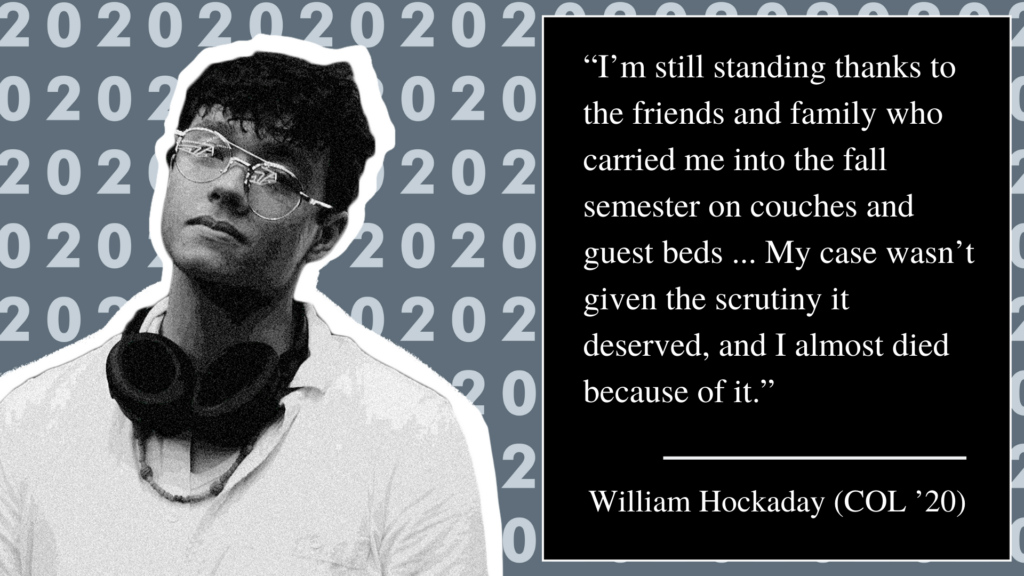CW: Homelessness, starvation and mention of suicide attempt
There’s a common misconception that low-income students pay nothing to attend universities like Georgetown University. Sometimes we pay with money, sometimes in other ways. We can even pay in trauma. I paid Georgetown twenty pounds.
Three summers ago, I was homeless. That summer started with so much hope. I remember the feeling of trust I had that my dream university wouldn’t let me slip through the cracks. Filing to be considered as an independent student meant I wouldn’t have to pay $1,300 to Georgetown for housing in the distant fall and I could focus solely on surviving that summer, and then everything would be alright. I was so full of hope, but when Georgetown denied my application to be classified as an independent student, only despair remained.
While my peers visited their beach houses and took vacations to distant islands, I couch surfed across south Austin, Texas. While they interned in Congress, I had to quit my internship to work more hours at the local Tex-Mex restaurant. I ate twice a day, sometimes once. The pain of starvation was not short and sharp, but long and dull. Ironically, over the course of two months spent serving families their meals, I lost twenty pounds — twenty pounds spent cutting costs like phone bills and groceries so I could afford a flight to Washington, D.C., and tuition. By the end of it all, I landed at Dulles International Airport with an empty bank account, $5 in my pocket and less meat on my body than I’d seen in a while.
There’s a common misconception that low-income students don’t belong at universities like Georgetown. That we have to pay our twenty pounds of flesh. That we then have to tell everyone we’ve already paid our twenty pounds of flesh to really belong. That we then have to accept that the university loves our narratives, but won’t truly listen and do what we need to survive.
I’m still standing thanks to the friends and family who carried me into the fall semester on couches and guest beds. One of my biggest supporters through this experience, though, was the Georgetown Scholars Program. When I struggled to find a place to stay, they connected me to a weeklong conference, all expenses paid. When the language of emails from the financial aid office went over my head, the staff at the GSP office acted as translators. When I lost all hope, when I was overwhelmed with despair, when I fantasized about a ledge and a drop, Corey Stewart, a student adviser at GSP, put some faith back in me.
While I’m grateful I’m about to make it over the finish line, I know my story will be told again. Students with abusive households are not rarities, and I now anxiously save money for my freshman friends who might just spend a summer homeless. The stakes are higher now than they were several years ago, though. Now, more than ever, it is important for Georgetown to hire a financial aid adviser who specializes in working with independent and homeless students. In the summer of COVID-19, the stakes are no longer twenty pounds, but someone’s life. Students facing housing insecurity and abusive homes must navigate hurdles that are at times insurmountable, other times absurd and most times both. My experience with the Office of Student Financial Services consisted of the minimization of the traumatic impact of homelessness, late notifications of necessary resources such as loan application deadlines and multiple rejections to become an independent student. A new financial aid officer dedicated to independent and homeless students would have the necessary caseload to properly notify students of resources available and provide guidelines to navigate their situation. This case officer would understand our needs and not just treat us as another GUID on a list.
People reading this article may wonder why I point to hiring a new financial aid adviser rather than updating the criteria to become an independent student. While both are needed, I offer the first option because when I came back to Georgetown, a financial aid officer notified me that I could amend my financial aid package. Apparently, my financial aid package did not truly reflect my family’s income, and I would be reimbursed for everything I paid while I was homeless. My case wasn’t given the scrutiny it deserved, and I almost died because of it.
My experience at Georgetown would be much harsher and shorter without GSP. Georgetown tried to teach me that I’m only worth as much as the traumatic stories I produce, but GSP taught me that there’s both beauty in the struggle and beauty outside of it. I matter now as a 22-year-old about to venture into a new world, and I mattered just as much as a homeless kid struggling to find their next meal.
William Hockaday is a senior in the College.










William Hockaday • Jul 30, 2020 at 6:20 am
Thank you, kindly. I truly appreciate your kind words.
Missy Foy • May 26, 2020 at 3:39 pm
Proud of you, Hock. Thank you for sharing your experiences generously, in the hopes that others might avoid similar ones. I also like the practical solution! xoxo
Mike Bento CAS'83 • May 26, 2020 at 8:31 am
Powerful piece – very well done. Thanks for challenging Georgetown and all of us to truly see you, and to step up.